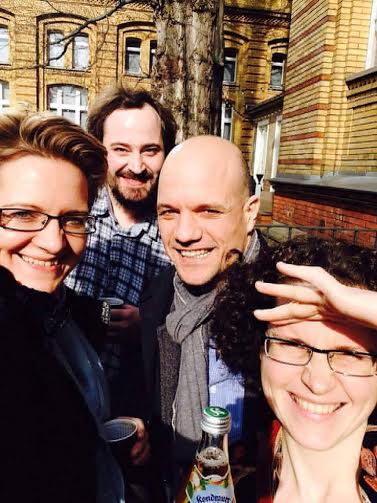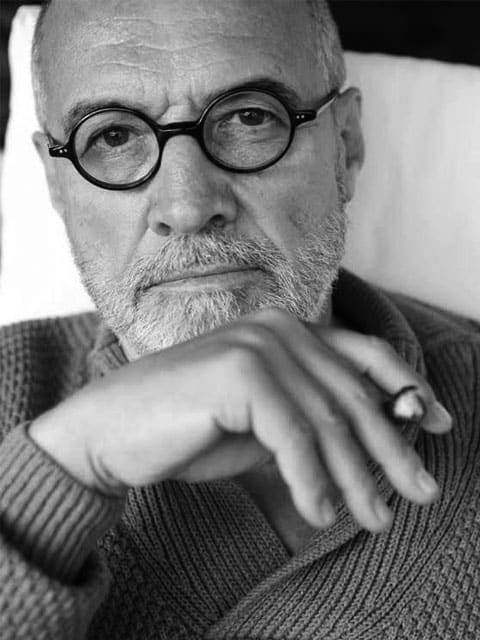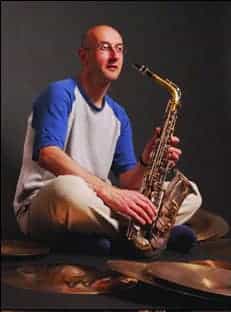Does a quartet lose its character when a player leaves?
mainOur diarist Anthea Kreston is one of two players in the Artemis Quartet who will leave at the end of this season. The other is the last of the quartet’s founding members, Eckart Runge. So who, or what, makes a string quartet? Is it the musicians, or is it the name? These are trenchant questions. Here are Anthea’s thoughts:
Who are we? Are we the same person when we are a child, an adult, and at the end of life? Our values change, our situations and priorities change. The continuity of the self – is this a certainty? When did I become a violinist – will I still be a violinist after my hands permanently curl and can not grasp the neck of my violin (arthritis runs in my family, so this will certainly be my fate) – was I a violinist before I ever even touched my first instrument? Is being a violinist simply an extension of my base personality – does it exist separately from my physical self? If I become a paraplegic, I believe I would still identify as a violinist. What is our identity, and what is the identity of a string quartet?
The Ship of Theseus. Two thousand years ago, the Greek historian and writer Plutarch outlined a brilliant thought experiment – one which I believe relates particularly well to the news which was quite jarringly announced earlier this week. The news that the Artemis Quartet, that bastion of the German art form of the string quartet – my colleagues and dear partners for these past 2.5 years, will be, in 9 months time, traveling along different paths. The Artemis, like so many quartets before them, have weathered and become stronger through triumph and tragedy – through personelle change, the loss of a colleague by his own hand, the development from brilliant, idealistic youth to international road warriors, never compromising in their core beliefs and dedication to their art. They have pushed me, and themselves, every moment, to be our best, individually and collectively, and I have never felt more challenged, and more proud of my accomplishments as a member of this group.
So – back to Plutarch.
The founder of Athens, the famed hero Theseus, slew a Minotaur in a great battle, and returned triumphant to Athens in his magnificent ship. To honor this amazing feat, the citizens kept his ship in the harbor, every year taking it on a replicate voyage of Theseus to celebrate his victory. They painstakingly and lovingly repaired it, replacing boards, mast, until, 1,000 years later, the final board was replaced, and no original part of boat remained. Plutarch’s question is – is the „restored“ ship the same as the original?
So – is the Artemis Quartet the same group as it was in 1989, with Wilken Ranck, Isabel Trautwein, Volker Jacobsen and Eckart Runge? Was the ship that they sailed into victory the same ship that was sailed by Natasha, Vineta, Heime, Friedemann, Eckart, Gregor and myself? When I first boarded the Artemis, it certainly felt like a vessel which had seen many battles, which was both fluid and powerful, which had a crew that knew how to man the deck and a consortium of captains. And yet, through my tenure, boards were delicately replaced – a new feeling here, a slide which was once verboten now included. I am a very romantic, sentimental player, and my style was bent and formed into the forged steel bouts of this ship, while still allowing for a flexibility of a new approach. A great thing cannot stand still, it must be in constant flux – it must change and grow to survive and flourish. It must adapt.
And so – is the Artemis Quartet the same? Will it remain the same? The answer, like the answer to Theseus‘ Paradox, cannot be found. It is both the same and different. It learns from itself, follows the guiding principals of its youth, and it watches, listens and adapts, incorporates and expands. It gathers all strengths, all of the sweat and sacrifice of all of its members, past, present and future, to create something simultaneously new and old.
We must wait, we must be patient, we must give our hopes and dreams to the future. I, personally, will be in that audience for years to come, to watch not the re-enactment of the great virgin voyage, but rather the continued sailing of a ship, always searching for the next adventure, fearlessly forging ahead with conviction, the knowledge of the past, and the vision of the future. God Speed, Mighty Artemis!






The answer, in my humble opinion, is: it depends on what kind of quartet is concerned. There are institution-based quartets like the Gewandhaus Quartet or the Juilliard Quartet which have existed for “generations” and will go on so long as it pleases their parent institutions. There are “private” initiatives like the Amadeus Quartet and the Quartetto Italiano, that have the same founding members (or the “definitive” members after initial adjustments in the beginning of the quartet’s career), and those quartets “are” their members, and they “die” with their members – as I look at my CD collections, I note that it is this kind of groups that I collected over the years. And there are “private” quartets that became a kind of corporation kept united by business contracts with lots of personal changes over the years.
The Borodin Quartet too. The current quartet is a good one, but it’s not THE Borodin Quartet.
I assume that this is what happens when you get your knowledge of Plutarch from Wikipedia. The internet is turning into one big Secondary School essay…
Go ahead and elaborate, o wise one!
the Allegri Quartet seem to keep a special quality through many changes, though I did feel the time Peter Carter was leader was exceptional (1970s concerts in the Holywell Music Room)
Aah, Heidegger’s axe. You use the axe for so long that, in the end the wooden handle wears out, so you replace it. After several more years the blade needs replacing. Is it still the same axe?
After many many years when all the trees have been cut down by the various incarnations of this axe and new ones have grown in their place*, is it still the same forest?
*(assuming that one is not cutting down trees faster than they can regrow)
IMHO, in a practical sense, the answer is yes. If you enjoy endless metaphysical debate, then the answer is… there can be no answer 😛
It’s the same question, on a smaller scale, as “Is the Boston Symphony the same orchestra as the legendary ensemble that played under Koussevitzky?” (Feel free to substitute your favorite famous orchestra and one or more of its famous historical music directors: Chicago/Reiner, or Berlin/Furtwangler, etc. etc.) In general, while people might argue about whether the group was better then or is better now, the consensus is that it is indeed the same group. But you could have the same debate.
The question brought to mind the famous Japanese shrine that is destroyed and rebuilt every 20 years: https://www.smithsonianmag.com/smart-news/this-japanese-shrine-has-been-torn-down-and-rebuilt-every-20-years-for-the-past-millennium-575558/
P.S. I would add that the character of the group will change, but not be lost — unless you are one of those who insist that any change from the original is necessarily a loss.
So what happened?
Schroedinger: The quartet is in a mix of yes and no until a concert when the observers decide
Heisenberg: The greater the character the fuzzier the intonation and vice versa
Bohr: It is open to interpretation
Hello Captain Obvious. The answer is yes.
…if change = loss.
Nah. I want to know who was sleeping with whom; who fell out over what; why the split. All that.
AK, as to the Artemis, I’ve loved what I heard and expect to love what I will hear. Looking forward to how you will reposition yourself and, if in a trio or quartet, hope to hear and, if so, expect to love. Please keep posting! Your posts have given this nonmusician a great deal, and I so appreciate your tact and graciousness.
Interestingly the Australian String Quartet split in half for, in this case, publicly documented reasons. The name doesn’t belong to the members though so the governing body decided that the violist & cellist stayed on in the new ASQ.
I heard the former first violinist of the ASQ last night.
In excellent form he now plays with the Australian piano quartet, which itself has changed all but one member recently.
Plus ca change, plus c’est la meme chose. (Tant pis, no accents on my iPad).
There could be many reasons why a quartet loses members apart from colleagues not getting along–better job opportunities or family issues. For example, as Anthea has mentioned it’s difficult for a mother to be away from school aged children for so long.
I do not know the music world but I see a lot of off-off Broadway theater. Not only would I not dare speak to actors during the intermission (on off-off Broadway a lot of times there is no real backstage) but I would not do so even after the performance and even in venues where the custom is for the actors to be available after the performance. I believe that they need to decompress.
As for myself it always amazes me when a good actor, that is, someone who seems to be really in the show as opposed to sounding as if he is saying lines can, within 5 minutes of the show ending, jump into their jeans and be their real selves and go on with their real lives when I, as a member of the audience, am still in the show !
Many years ago I saw a TV interview with the famous pop singer Barry Manilow who was asked by a member of the studio audience how he prevents crying while he is singing so emotionally. He answered “Practice”.
I guess that that must be true also with the classical musician who is able to get beyond technique and infuse his/her music with emotion while still being a little outside of it and be able to go back to his/her life after the performance.
Regarding your last paragraph: I used to tell my students (once they got to a sufficiently advanced level where this kind of thing became relevant) to think of how you can use a magnifying glass to focus sunlight and burn things. (I used to do it to ants when I was a small savage.) The lens — if I may speak anthropomorphically — probably has some idea of heat and energy being focused through it, but does not itself get burned or noticeably hot. I would tell them to be the magnifying glass, not the ant.
This is a beautiful and generous article.
Anthea, I’m really heartbroken – Ive followed the AQ through your blogs and learned so much and loved everything you have written. Will you keep writing each week? I’m not surmising anything about the decision of two of you to leave – there will be individual and personal reasons and I feel reassured you are leaving on good terms and happy to have been part of the Quartet. This Anthea Kreston fan who is so disappointed that I wont get to see you playing in the Quartet.
Hi Marg –
Just saw this one. I don’t know about writing – Norman and I haven’t talked about it yet. I suppose I will continue until next summer in any case, and it depends on if I do something exciting or just fall off the end of the earth after Artemis. Both options are possible! And Marg – we absolutely have to meet some day!!!!